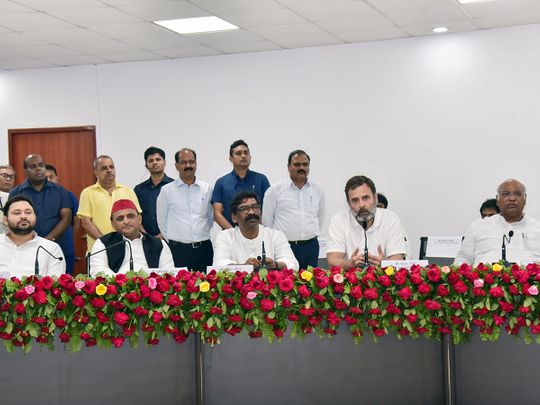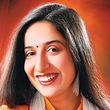
Ignore the doomsayers raining on the opposition unity efforts. As Lalu Prasad Yadav, fully recovered from his kidney transplant and back in full political form, said, "Yeh sab barsati medhak hain. Bhaag jayengey" (these are seasonal frogs who are croaking. They will run away after the rain).
Seventeen political parties, spanning from the south to the north of India, have come together on a common platform and vow to field a single candidate against the Bharatiya Janata Party (BJP) in all constituencies. This has certainly unsettled the BJP.
Two developments indicate the BJP's concern: their high-decibel attempt to discredit opposition unity and frantic efforts to secure new allies in the now dormant National Democratic Alliance. After the 2019 general elections, the BJP arrogantly shed allies, believing it was the dominant force in Indian politics.
In reality, the party's geographical influence has diminished after losing Karnataka, and they are now diligently courting potential allies, including those considered as "vote katua" (vote cutters), who function as the BJP's "B" team.
This outreach is a direct result of the Patna meeting organised by Bihar Chief Minister Nitish Kumar, who has emerged as the "sootradhar" (thread holder) of opposition unity. Thanks to Kumar's extensive efforts and patience, the meeting showcased a perfect picture of opposition unity, even bringing Mamata Banerjee, Chief Minister of West Bengal, to the table with her longstanding rival Sitaram Yechury of the left.
Rahul Gandhi of the Congress party also shared the stage with Arvind Kejriwal, Chief Minister of Delhi and the supremo of the Aam Aadmi Party, despite the two parties' historic aversion to each other.
Notably, Gandhi realised the advantages of having Mallikaarjun Kharge as the party chief, as Kharge reprimanded Kejriwal in front of the other leaders for AAP's continuous attacks on the Congress. Gandhi, in turn, informed Kejriwal that Kharge's approval would be necessary for a one-on-one meeting.
Newfound comfort and camaraderie
Senior leaders present at the meeting conveyed to me that Gandhi displayed a newfound comfort and camaraderie with other leaders, a stark contrast to his previous reticence and unease. In Patna, Gandhi attentively listened to the other leaders, and this was warmly received, especially by Banerjee and Sharad Pawar of the NCP, who had previously preferred Sonia Gandhi, the former Congress President, as the lynchpin of opposition unity.
Kumar ensured that other senior leaders with prime ministerial ambitions understand that an effective opposition to the BJP requires the Congress. This realisation may have contributed to Gandhi's newfound ease.
While the meeting showcased crucial political chemistry, the opposition's focus was on the issues they aimed to tackle to defeat the BJP. The prominent idea, akin to Karnataka, was to vocalise support for local issues, essentially addressing the "bijli sadak paani" (electricity, roads, and water) concerns that significantly impact voters' lives.
Significant challenge for the BJP
Most leaders present, including heavyweight M.K. Stalin, Chief Minister of Tamil Nadu, were clear that the opposition must champion subaltern issues like conducting a caste census to ensure governance delivers to beneficiaries based on their actual representation in the census.
The opposition is aware that this poses a significant challenge for the BJP and is an integral aspect for the Rashtriya Swayamsevak Sangh (RSS), the BJP's ideological parent, which emphasises a united Hindu community.
One of the top leaders at the meeting, speaking to me, said, "The BJP and Modi ji are soaring high as global statesmen; they no longer care about the genuine issues of the overwhelmingly numerous poor people in India. The opposition knows that this is perhaps the last chance to break the BJP's stronghold; otherwise, most opposition leaders will face an ignoble retirement."
United fight against the BJP
This urgency serves as the glue holding the opposition together, fueled by the fear of their careers ending if the BJP returns to power and concerns over investigative agencies' overreach in cases against opposition leaders.
Rahul Gandhi, for instance, lost his parliamentary seat, his home for 19 years, and faces multiple defamation cases. This explains his readiness to join forces for a united fight against the BJP.
Two noteworthy points: Mayawati, the leader of the Bahujan Samaj Party (BSP), criticised the Patna meeting a day before it took place. Opposition leaders clarified that they didn't invite her due to her political difficulties, specifically her team "B" status with the BJP.
This marks a subdued end to Mayawati's trailblazing innings as a Dalit icon and four-time Chief Minister of Uttar Pradesh, India's most significant political state.
Lastly, a former poll strategist turned Yatra politician is now focused on sabotaging opposition unity at the BJP's behest, exemplifying the typical cycle of Indian politics.









